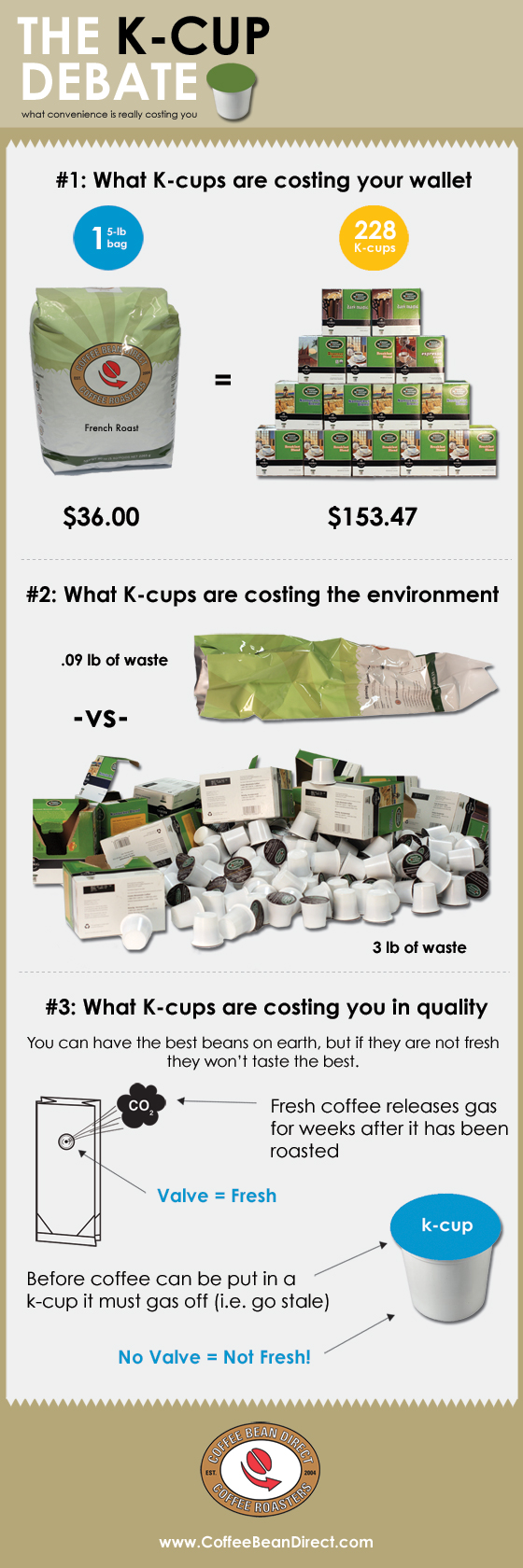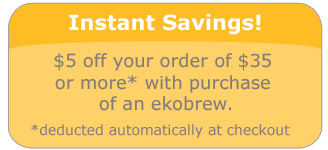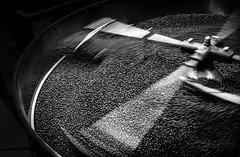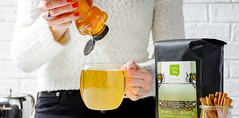Too Fresh for the Coffee Aisle
Wednesday, September 12th, 2012 by Andrew
What exactly are we getting at with our new slogan?
The other day I discovered a dusty can of (non-Coffee Bean Direct, I’ll admit it) ground coffee in the back of my cabinet. Not only was it not past the date stamped on the can, but I still have another nineteen months to enjoy it at its “best.” How can this be? Working at Coffee Bean Direct, I’ve learned that roasted coffee is a perishable item with a shelf-life closer to lunch-meat than ramen. Bad coffee will not poison you however, which is why those mysterious best-by dates can range from 3 months from the date of purchase to more than two years.
This improbable freshness window is created with supermarkets in mind. Large stores typically order their coffee as needed from distribution centers where products sit for weeks at a time. A generous best-by date takes all that wait time into consideration. So when is coffee actually fresh? When it has flavor, and the closer to the roast-date the better the flavor. Packaged well, whole bean coffee can retain its flavor for six months to a year. How quickly coffee goes stale varies with the bean variety and roast level, among other things, but as a rule we never ship any coffee more than thirty days old, and grind it shortly before shipping.
Why does coffee lose its flavor with age?
After roasting, coffee beans go through a “de-gassing” period during which they release CO2. The fresher the coffee, the more gas it produces, and these gases contribute to the aroma and the flavor of the coffee. Eventually coffee beans stop producing gas and can be considered stale. Exposure to air, heat, moisture, and even light speeds the whole process along. Sealed bags with one-way valves indicate that coffee was packaged while fresh, allowing CO2 to escape without admitting oxygen. Coffee in other types of containers—like k-cups or vacuum-sealed packages—were allowed to de-gas before sealing (those k-cups would explode if packed with freshly roasted coffee). What you’re getting is a product that is unlikely to change much in terms of freshness, because it is already stale.
Is fresh coffee worth seeking out if stale is all you’ve ever known?
That depends on whether or not you care about how things taste. If you enjoy coffee because it is brown or because it is caffeinated you’re in luck – those qualities won’t change much with age and any coffee will do. To me, stale coffee is flat and dull and I don’t know why people stand for it. It’s as if we’re training our mouths to accept the realities of a post-apocalypse diet of food from the bunker. As for that can in my kitchen, I’ll probably hang on to it in case of emergency. Caffeine fills me with magnanimous good cheer, which might be in short supply post-apocalypse, along with potable water. But until the day comes when I have to gnaw old grounds like an animal, I’ll enjoy the fresh stuff!
What’s lurking in your kitchen? Check out the dates on your coffee, new or old, and let us know what you find!
P.S. If your coffee happens to be from us, we label our bags with a five-digit roast date, known as the Julian date. The last two numbers indicate the year, and the first three the day from 001 to 365. To easily match the code on your bag with a month and day, check out this handy chart!
What exactly are we getting at with our new slogan?
The other day I discovered a dusty can of (non-Coffee Bean Direct, I’ll admit it) ground coffee in the back of my cabinet. Not only was it not past the date stamped on the can, but I still have another nineteen months to enjoy it at its “best.” How can this be? Working at Coffee Bean Direct, I’ve learned that roasted coffee is a perishable item with a shelf-life closer to lunch-meat than ramen. Bad coffee will not poison you however, which is why those mysterious best-by dates can range from 3 months from the date of purchase to more than two years.
This improbable freshness window is created with supermarkets in mind. Large stores typically order their coffee as needed from distribution centers where products sit for weeks at a time. A generous best-by date takes all that wait time into consideration. So when is coffee actually fresh? When it has flavor, and the closer to the roast-date the better the flavor. Packaged well, whole bean coffee can retain its flavor for six months to a year. How quickly coffee goes stale varies with the bean variety and roast level, among other things, but as a rule we never ship any coffee more than thirty days old, and grind it shortly before shipping.
Why does coffee lose its flavor with age?
After roasting, coffee beans go through a “de-gassing” period during which they release CO2. The fresher the coffee, the more gas it produces, and these gases contribute to the aroma and the flavor of the coffee. Eventually coffee beans stop producing gas and can be considered stale. Exposure to air, heat, moisture, and even light speeds the whole process along. Sealed bags with one-way valves indicate that coffee was packaged while fresh, allowing CO2 to escape without admitting oxygen. Coffee in other types of containers—like k-cups or vacuum-sealed packages—were allowed to de-gas before sealing (those k-cups would explode if packed with freshly roasted coffee). What you’re getting is a product that is unlikely to change much in terms of freshness, because it is already stale.
Is fresh coffee worth seeking out if stale is all you’ve ever known?
That depends on whether or not you care about how things taste. If you enjoy coffee because it is brown or because it is caffeinated you’re in luck – those qualities won’t change much with age and any coffee will do. To me, stale coffee is flat and dull and I don’t know why people stand for it. It’s as if we’re training our mouths to accept the realities of a post-apocalypse diet of food from the bunker. As for that can in my kitchen, I’ll probably hang on to it in case of emergency. Caffeine fills me with magnanimous good cheer, which might be in short supply post-apocalypse, along with potable water. But until the day comes when I have to gnaw old grounds like an animal, I’ll enjoy the fresh stuff!
What’s lurking in your kitchen? Check out the dates on your coffee, new or old, and let us know what you find!
P.S. If your coffee happens to be from us, we label our bags with a five-digit roast date, known as the Julian date. The last two numbers indicate the year, and the first three the day from 001 to 365. To easily match the code on your bag with a month and day, check out this handy chart!




















